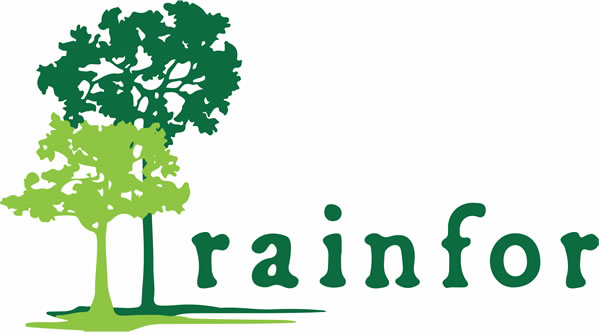Our emphasis throughout the network is on cross-cutting integrative science to help develop a new generation of scientists with diverse interests and cross-disciplinary skills. We are also fostering the development of young scientists, botanists and field technicians in the developing regions where we work, providing interactions and opportunities that would otherwise be unavailable to them.
In particular:
- Within the RAINFOR network many partners are training a number of post-doctoral associates and PhD students from Latin American countries, in Brazil, Colombia, the UK, Netherlands and France, providing significant opportunities for young researchers to start and establish their careers, and eventually move into research leadership.
- The regular RAINFOR-supported field campaigns to monitor permanent forest plots throughout the basin provide further experience to young, national scientists at different levels of scientific expertise. Manuals for field methods have been translated in Spanish and Portuguese and are freely available online.
- Since 2002, RAINFOR projects have always involved significant training and development. As a result of this we have trained up more than 300 students and technicians in field techniques, as well as helping more than 20 students go on to get their PhDs and/or further post-doctoral experience in Europe, the United States, and Latin America. Several of these colleagues are now in early career-stage leadership positions in Latin American research institutions.
Below, we provide short reports of key field and laboratory training courses offered through RAINFOR since 2008.
2018
MonANPeru-SERNANP: Analysis of data on dynamics and ecological changes in tropical forests based on permanent monitoring plots; National Agrarian University of La Molina, Lima, Peru 25-26 July 2018
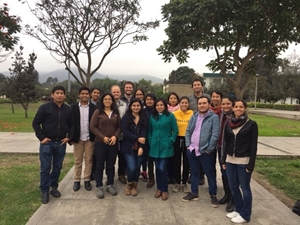
As part of the project “Monitoring protected areas in Peru to Increase forest resilience to climate change (MonANPerú)” Dr Karina Banda and Dr Martin Sullivan led a highly successful training course to analyse the dynamics and ecological changes in Peruvian tropical forests.
The course was attended by 20 people, including students, researchers and specialists from the Peruvian Protected Areas Authority (SERNANP). Participants learned how to use ForestPlots.net as a tool for forest data management and analysis and how to calculate and interpret the parameters of biomass and tree mortality rate, using the BiomasaFP package in the programming language R. The participants explored a range of issues including the impact of El Niño event in 2016 on the dynamics and structure of the forest, and the contributions of castaña (Brazil nut; Bertholettia excelsa) trees to the carbon stocks of the Tambopata National Reserve.
Perhaps the most exciting aspect of the course was working with professional staff from SERNANP to use the plot data to understand the ecology of the species that they manage, and discuss the implications for management and monitoring. The course demonstrated how ForestPlots.net can be used to put valuable ecological information directly into the hands of the people and organisations who work on the ground to manage tropical forest resources.
MonANPerú is funded by the Gordon and Betty Moore Foundation. The course was funded by the Royal Society (Global Challenge Research Fund) and the Moore Foundation, and supported by the Herbario Forestal (MOL).
Federal University of Acre–RAINFOR: Análises Básicas da Vegetação em Ambiente R: Biomassa, Produtividade e Diversidade Arbórea usando dados do Forestplots.net; Rio Branco, Brazil
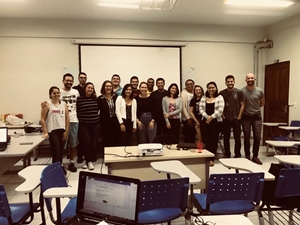
Fernanda Coelho de Souza (University of Leeds, UK), Wendeson Castro and Richarlly Costa (Federal University of Acre, Brazil) taught a mini course sponsored by RAINFOR in Rio Branco, Acre, Brazil. The mini-course titled, “Basic Analysis of Vegetation in Environment R: Biomass, Productivity and Arboreal Diversity using data from Forestplots.net” was held at the Federal University of Acre and was attended by 16 undergraduate students in Biology and Forestry Engineering. With a workload of 20 hours (13 to 15 June) participants learned how to use ForestPlots.net as a tool for forest data management and analysis and how to analyze biomass, dynamics data forest and biological diversity in the environment R. The main topics covered in the course were:
• Why Monitor Tropical Forests?
• Methodology and Protocol for vegetation structure minimization
• Biomass and Forest Productivity Analysis using Forestplots.net/ RAINFOR BiomasaFP R package
• Analysis of arborea biodiversity and its relationships with estimates of biomass and productivity
• Visualization of the results using graphs and maps using the R environment
• Use Markdown to export results and assemble analysis reports
The students had the opportunity to present the analyzed results and discuss the main patterns found. A special thanks to RAINFOR collaborator Dr. Marcos Silveira (UFAC) and to the Graduate Program in Ecology and Natural Resource Management of UFAC that offered the support in the logistics and organization of the mini course.
2017
MonANPeru: Usando los datos ForestPlots.net para crear indicadores para apoyar la gestión de los ANPs , Iquitos, Peru
Karina Banda and Tim Baker (University of Leeds, UK) ran a 2 day workshop (12-13th December 2017) as part of the MonANPeru project 1 year meeting: Monitoreo de áreas naturales protegidas en el Perú para incrementar la resiliencia de los bosques ante el cambio climático: ‘El progreso y los retos’. The workshop focused on the use of ForestPlots.net data and the R package BiomassaFP to design and calibrate indicators for sustainable forest management. 35 participants attended the course, representing research institutes: IIAP, JBM, La Molina University, Wake Forest University; The National Park Service of Peru: SERNANP; and NGOs: WCS and CIMA. Topics covered included:
- Consideraciones generales en el análisis de datos
- El concepto de los indicadores
- El uso del paquete BiomasaFP y R para manipular los datos de las parcelas
MonANPeru: Manejo de los datos ecológicos con Forestplots.net , Iquitos, Peru
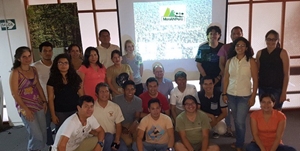
Georgia Pickavance (University of Leeds, UK) also led a 2 day workshop as part of the MonANPeru project 1 year meeting ‘El progreso y los retos’. The workshop focussed on the use of ForestPlots.net as a data management tool for the MonANPeru project. The workshop had two halves: one for completely new users, and another for the previous year’s participants to further develop their data management skills specific to the project. 12 participants attended the mini course, from project partners IIAP, JBM, La Molina University and the Peru National Park Service SERNANP. Topics covered included:
- Introduccion a ForestPlots.net
- Protocol de RAINFOR
- Ingressando datos al ForestPlots.net (practical)
- Bajando datos de ForestPlots.net (practical)
- ‘Troubleshooting’ el ingreso de los datos de MonANPeru con ForestPlots.net
- ‘Troubleshooting’ el control de calidad de los datos de MonANPeru con ForestPlots.net
Many thanks to Euridice Honorio (IIAP) for providing support and logistics.
2016
MonANPeru: Manejo de los datos ecológicos con Forestplots.net, Iquitos, Peru
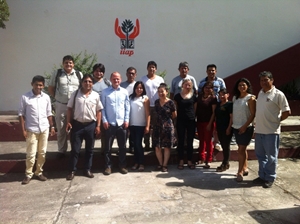
Georgia Pickavance (University of Leeds, UK) led a workshop which formed part of the initial meeting for new project MonANPeru (Monitoreo de areas naturales protegidas en el Peru para incrementar la resiliencia de los bosques ante el cambio climatico) organised by Tim Baker (University of Leeds, UK) and Euridice Honorio (IIAP, Peru). The 5 day course (23 November – 2nd December) took place in Iquitos, Peru, eitherside of fieldwork in Allpahuayo Mishana National reserve where Abel Monteagudo-Mendoza (JBM, Peru) and Gerardo Flores (IIAP ProBosques, Peru) also led a training session in RAINFOR protocol field techniques. 8 participants from Peru attended the workshop, representing the 2 field teams that would be collecting the project data: Instituto de Investigaciones de la Amazonia Peruana (IIAP) y Jardin Botanico de Missouri (JBM). Topics covered included:
- Introduccion a ForestPlots.net
- Ingressando datos al ForestPlots.net
- Control de Calidad de datos con ForestPlots.net
- Bajando datos de ForestPlots.net
- Manejo de fotos de muestras botanicas
PPBio-RAINFOR: Workshop de gerenciamento e análise de dados de vegetação, Manaus, Brazil
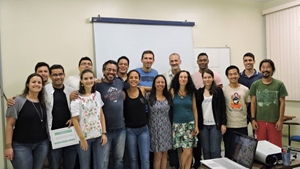
Gabriela Lopez-Gonzalez (School of Geography, University of Leeds, UK) coordinated the scientific content and was the principal tutor in a workshop organized by Flavia Costa (INPA / PPBio, Brazil). The 5-day course (25th to 29th of April 2016) entitled “PPBio /RAINFOR: Workshop de gerenciamento e análise de dados de vegetação” took place in Manaus, Brazil. 21 participants from Brazil attended and took part in the course, in which they learned how to use ForestPlots.net as a tool for forest data management, how to analyse biomass, dynamics and diversity information with the RAINFOR developed R Package, and shared best practice for analysis and data use. Please visit the RAINFOR Facebook Group page (RAINFOR.project) to see some photos from the event.
The workshop was taught by Gabriela Lopez Gonzalez with help from Thaiane Rodrigues de Sousa (PPBio) and Fernanda Coelho de Souza (RAINFOR / PPBio / CENBAM). Main topics included:
- Data input: how to upload new census data
- Quality control: to ensure data is comparable within different census and between other research sites
- Data analysis: carbon calculation, carbon balance, stem dynamics and biodiversity using the ForestPlots.net / RAINFOR R package
- Feedback: to ForestPlots.net / RAINFOR teams to determine the specific needs of the users, and improve accessibility and interpretation of information for the future
Dry Forest workshops in Data management using ForestPlots.net, Campos, Brazil
The workshop was part of the activities of the NERC project “Dry forest biomes in Brazil: biodiversity and ecosystem services”. The workshop took place in Campos (16-17th April), at the Universidade Estadual do Norte Fluminense Darcy Ribero. This workshop was attended by 10 participants from Brazil and was coordinated by Marcelo Nascimento.
2015
September
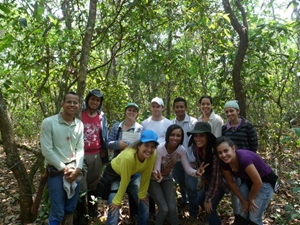
Training RAINFOR – Excellence in data collection – Bacaba Park, New Xavantina – Mato Grosso, Brazil
This course was held on the 9th and 10th of September 2015 with the main objective to train future partners of The Amazon Forest Inventory Network (RAINFOR) in the demarcation of permanent plots. The course was coordinated by Prof. Beatriz Schwantes Marimon and taught by team members of the Plant Ecology Lab at UNEMAT-NX (Fernando Elias, Paul Morandi and Bianca de Oliveira).
July
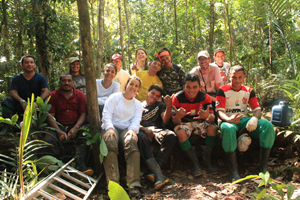
The Amazon Forest Inventory Network (RAINFOR) joint with the Brazilian Program for Biodiversity Research (PPBio) and Center for Integrated Studies of Biodiversity in the Amazon (CENBAM) promoted the course “Herborization techniques, identification of tree species and vegetation structure”. The 7-day course (6th to 13th of July 2015) took place at km 100 of BR-319, Manaquiri a rural community in Carreiro Castanho – Amazonas. 12 participants from 5 communities along the BR 319: Careiro, Castanho, Araca, Puru-Puru and Manaquiri attended and took part in the course, in which they learned: how to collect botanical material, herborization and identification of woody angiosperms, mapping trees using a system of x and y coordinates, and standard protocols for diameter measurements and heights according to the protocols used by RAINFOR / PPBio to measure and monitor vegetation structure and biomass.
The course was conducted by Marcos Silveira (RAINFOR / PPBio / CENBAM / UFAC), Fernanda Coelho de Souza (RAINFOR / PPBio / CENBAM), Thaiane Sousa (PPBio / INPA) and Adriane Esquivel Muelbert (RAINFOR). The training provided an opportunity to involve local participants, with sharing protocols and data collection techniques. Moreover, it provided a unique opportunity to prepare teams and identify key leaders who will be involved in collecting and monitoring vegetation dynamics along the federal road connecting Manaus (AM) to Porto Velho (RO).
2014

Gabriela Lopez-Gonzalez and Joey Talbot (School of Geography, University of Leeds, UK) coordinated the scientific content and were the principal tutors in a workshop organized by Abel Monteagudo and Rocio Rojas (Jardin Botanico del Missouri, Peru). The 5-day course (25th to 29th of August 2014) entitled RAINFOR: Estudiando la Diversidad y Biomasa Forestal en el Oeste de la Amazonía – “Manejo y análisis de datos ecológicos con Forestplots.net” took place in Cusco, Peru. Nearly 30 participants from Peru, Bolivia and Brazil attended and took part in the course, in which they learned how to use ForestPlots.net as a tool for forest data management and how to analyse biomass, dynamics and diversity information. Please visit the RAINFOR Facebook Group page (RAINFOR.project) to see some photos from the event.
2011
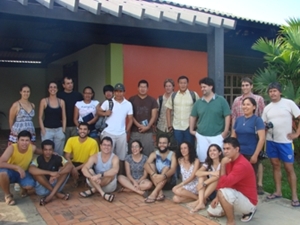
Ted Feldpausch (Univ Leeds, UK), Carlos Quesada (INPA, Brasil), Marcos Silveira (UFAC, Brasil), Chris Doughty (Oxford, UK), Flavia Costa (PPBio, INPA, Brasil) and Cleber Salimon (UFAC) led in June 2011, a RAINFOR-Moore sponsored workshop in Rio Branco, Acre, Brasil. The workshop, “Environmental science in Amazonia: RAINFOR as a catalyst to integrate projects under a regional network, analyse data and develop manuscripts” was hosted at the Escola da Floresta, and taught methods in data analysis and manuscript development. The 1-week workshop brought together 26 RAINFOR students, field technicians and collaborators from Brazil, Venezuela, Colombia, Peru and Bolivia and six instructors from Brazil and the UK and provided an opportunity to learn new techniques, meet RAINFOR collaborates from other regions, and share ideas and results. Each student presented his/her results during the workshop and developed an outline and preliminary analysis for a manuscript. Foster Brown provided a mid-week guest lecture. Many thanks go to Marcos Silveira and students from his laboratory who provided excellent support in organising the workshop and hosted a warm welcome dinner to the students and professors at a local ranch.
2009
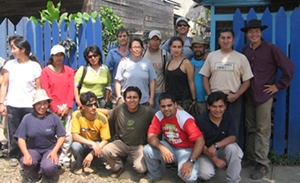
In 2009, RAINFOR members supported the Peruvian Amazon Research Institute (IIAP) in Iquitos, Peru for training people interested in the carbon cycle of Amazonian forests. Two workshops were organized “Statistical Analysis to support the design of carbon inventories” (15 – 17 May 2009) and “Integrated measurements of carbon fluxes in Amazonia” (23 – 31 August 2009) which emphasised basic concepts related to the measurement and analysis of the carbon cycle in tropical forests. The workshops were funded by the IIAP, the Gordon and Betty Moore Foundation, and the ESPA program of NERC-ESRC-DfID. The links to the materials presented in the workshops are at: https://www.gob.pe/iiap.
2008
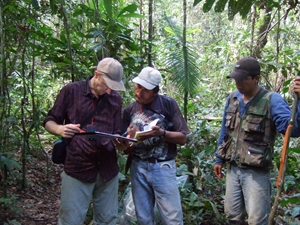
23 participants from across Latin America and Europe attended the ‘Los Amigos Forest Ecology Training’ workshop (5 – 11 August 2008) for young scientists in using tree plots for assessing and monitoring the structure and function of tropical forests. The workshop was organized by the RAINFOR project with support from the Moore Foundation, and took place at the Los Amigos Research Centre and Conservation Concession (CICRA), Madre de Dios, Peru. The excellent facilities of this fantastic study site, a wildlife-rich reserve in the heart of the Peruvian Amazon and located at the southern end of the continuous western Amazon forest that stretches as far north as Colombia and Venezuela, helped make it a success. Participants were trained in standard international techniques for assessing forest structure and dynamics (wood density, stand biomass, tree and liana growth rates, and modes of mortality) and carbon cycling (production of litter and woody debris, necromass, root biomass, and soil respiration). The emphasis was on field techniques, supplemented by short lectures, with teaching provided by staff from Brazil, Peru, the UK, the US, and the Netherlands.
